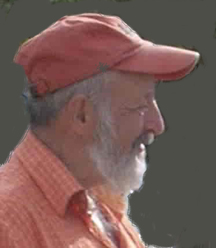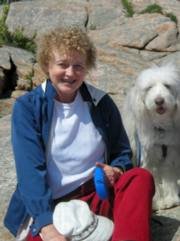
My Guest Oct 17 2006 5PM will be author and pilot Patrick Smith:
The 5X5 Interview: Patrick Smith, Ask The PilotPatrick Smith is sure one doggone aviator extraordinaire. In his "Ask the Pilot" column for Salon.com, he dispels common airline myths, explains the beauty of certain flight patterns, and tries to keep terrorist hysteria to a minimum. That's all well and good, but what about the mile-high club and how getting bumped to first-class simply ruins you for flying with the peons in steerage ever again? We asked the pilot these questions and more, and miraculously he answered without demanding security strip search us first.
Age: 38
Occupation:
Patrick Smith is an erstwhile airline pilot and author of a popular weekly air travel column at
Salon.com and
a book author. Location: Somerville, Massachusetts, just outside Boston
1. The fan mail from your column: I bet you receive an inordinate amount from people wanting to discuss the "mile-high club." What would you like to say here to end this conversation once and for all (well, at least for me)?
That it's not worth the effort? Granted this is one of those for-the-sake-of-it thrills, but the novelty only goes so far. I mean, what could be a more erotic setting than the closet-sized lavatory of a jetliner, wedged between a chemical toilet and a filthy, napkin-clogged waste receptacle? But hey, knock yourself out.
That said, some airlines are installing lower-deck sleeping suites for premium class passengers. Those on Virgin Atlantic, I remember reading, will have full double beds and total privacy.
As for me I'll admit nothing, but, not for any reason, I'd like you to imagine three things: (1) A Swedish exchange student. (2) a four-seat Piper Cherokee (with no autopilot). (3) a lazy half-hour above the marshes and estuaries of Newburyport, Massachusetts.
2. Salon is rightfully proud of its independent-press status. Is it an ethical choice of yours to work for them or could you just as easily see yourself in an office in the towers of Conde Nast?
It's less a choice than an accidental fit. I'm a pretty liberal guy, politically, which lends itself nicely to Salon's leanings. Not sure how that happened; I grew up in a blue collar suburb and went to a Catholic high school. But during the mid-1980s, in my late teens, when most would-be pilots were enlisting for ROTC, I was hanging out in the hardcore punk rock scene, which, if you remember, was virulently leftist and anti-Reagan. Most of my ideological sensibilities probably owe to that period -- getting out of the suburbs and into the city.
But finding a home at Salon wasn't by design. I certainly don't *choose* to use credit cards to pay my rent, and a mainstream gig could make life a lot more comfortable.
I think (hope) Salon appreciates my ability to pull in readers from across the spectrum, at least when I stick to aviation's more nuts-and-bolts issues. You'd be surprised, though, how often ideology makes its way into a topic. As a general subject, air travel is seemingly apolitical -- at least the way others have covered it -- but there have been loads of partisan controversies: debates over security, racial profiling of passengers, cockpit guns and so forth. Some of my writing gets fairly provocative. Last winter, you might recall, a Christian pilot found himself in hot water after he evangelized to a planeload of people over the PA. So I went and looked at
the way airlines around the world mix religion and flying. Those were two of my favorite columns.
3. I was once bumped up to first-class for a Virgin flight to the U.K. and I really don't know if I can fly in lesser accommodations again. The other half really does live quite a lot better. Can you dispel any of the wonderful feelings that remain from that flight, or is it really as good as it seemed for that one blissful trip?
You're screwed. There's no going back. It's funny though, your use of the phrase, "the other half." I used to have a girlfriend who was repulsed by the idea of separate classes on airplanes. Obviously she never had a sleeper seat on a 14-hour nonstop.
It's ironic, because while we whine about the worsening discomforts of economy class, things have never been more luxurious up front. (A sign of impending class warfare, my old friend would probably say.) Enclosed sleeper suites, 14-inch personal video screens, even a turndown service.
Now, don't confuse domestic first class with international. There's a world of difference, and carriers tailor their service to specific routes. Neither should you confuse most U.S. airlines with those overseas. The Asian and European carriers especially, have perfected the art of long-haul comfort. As I write in my book, the service levels aboard U.S. airlines aren't quite the laughing stock of the world, but it's something like that or well on its way. Singapore Airlines, perennial passenger service champ, hands out designer pajamas for each leg of your flight.
Even -- or especially -- in coach, the more prestigious foreign lines put U.S. standards to shame. I recently flew from Hong Kong to Bangkok aboard Emirates, the carrier of Dubai (United Arab Emirates), and it was fantastic. We had six-page menus, adjustable foot and head rests, personal videos, a crew that spoke 12 languages. In economy.
4. Columnists, whether they're sports or aviation columnists, usually have a much more well-rounded education/interest than just their column subject. How much of your other interests do you manage to slip into your column?
Whether I'm more cerebral or, as you say, "well-rounded" than other pilots is debatable, but it's always fun to venture off-topic, just to see who notices whatever reference you've chosen to slide in. Song lyrics, favorite authors or artists, and such. I love to travel, having been to fifty or so countries, and a few of my articles have veered almost into full-blown travelogues.
That's part of my schtick, though: I don't write about planes, I write about air travel. As a kid, it wasn't only flying, in and of itself, that infatuated me; rather the opportunities it presented. Aerobatics and fighter planes bored me, but I could spend hours studying the routes and timetables of the airlines. We've come to see flying as little more than an inconvenient means to an end, and I'm trying to reattach it to the greater realms of geography and culture -- not incidental to the journey, but part of it. In 2004 you can step aboard a plane in New York and fly nonstop to fucking Singapore! If that can't amaze and impress you, something's wrong.
5. How about word association? I say, "People who buy the dirty magazines at the airport newsstands are scary individuals." You say . . .
Only if they read them on board. Which brings up a possible and disturbing variation of the Mile High Club, above.
An adaptation of the columns, "Ask the Pilot," was recently published by Riverhead books. An index of Patrick's online articles can be viewed
here. For more information on his book, check out
Ask The Pilot.



















